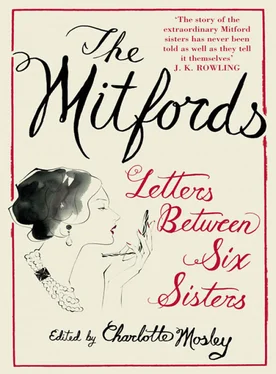I have left unchanged the sisters’ numerous nicknames for one another as they are intrinsic to their relationships, but for clarity I have standardized other nicknames and regularized their spelling. The only other editorial changes that have been made to the text are the silent correction of spelling mistakes – except in childhood letters; the addition of punctuation where necessary; and the rectification of names of people, places and books. In my footnotes and section introductions, I have referred to people variously by their first name, surname or title, aiming for quick recognition rather than consistency. Foreign words or phrases have been translated in square brackets in the text; the translation of longer sentences has been put in a footnote.
As a child, Nancy invented a game in which she played a ‘Czechish lady doctor’ and adopted a thick foreign accent. This voice endured and the letters are scattered with ‘wondair’ for ‘wonderful’, ‘nevair’ for ‘never mind’, and other phonetic approximations of Mitteleuropean English. After Nancy moved to France, should she ever use a French word in conversation, Deborah, who did not admit to speaking the language, would interject with ‘Ah oui!’ or ‘Quelle horrible surprise’, expressions that have found their way into the letters. Deborah was also the instigator of the frequent plea ‘do admit’ – not something any Mitford did willingly – which was an attempt to catch the attention of one of her siblings and get them to agree with her. The exaggerated style of writing that the sisters used, a continuation of the drawling way in which they spoke, began in childhood and originated in part from their brother Tom’s ‘artful scheme of happiness’, a particular tone of voice that he employed when trying to wheedle something out of someone. ‘Boudledidge’, which Jessica and Unity often used in their letters to each other, was a derivation of this way of speaking. ‘Honnish’, a language invented by Jessica and Deborah, was derived not from the fact that as daughters of a peer they were Honourables but from the hens that played such an important part in their upbringing. Their mother, Lady Redesdale, had a chicken farm from whose slim profits she paid for the children’s governess and the sisters each kept their own birds and sold their eggs to their mother in order to supplement their pocket money.
The Mitford sisters all wrote in longhand, except for Jessica who learned to type at the beginning of the war. Their handwriting is clear and legible, and, as a rule, they dated their letters. Pamela, who was probably dyslexic, kept a dictionary at hand and her spelling is usually accurate. Her occasional use of unorthodox capitalizations and spelling has been retained. The sisters’ letters to each other are held in the archives at Chatsworth, where they have been collected by Deborah, with the exception of those written to Jessica which are in the Rare Books and Manuscripts Library at Ohio State University. The letters in this volume are previously unpublished, except for a dozen that were included in Love from Nancy and three times that number in Decca . 1
At a certain point, the sisters became aware of the value of their letters and of the possibility that they might one day be published. In 1963, Nancy advised Deborah to throw nothing away because the correspondence of a whole family would be ‘gold for your heirs’. Pamela, who until then had discarded most of her letters, began to preserve them, and Jessica started keeping carbon copies of her correspondence in the 1950s. It is nevertheless abundantly clear that the sisters did not write with an eye to posterity; the frankness, immediacy and informal style of their communications bear this out. Only when I had begun editing these letters did the idea of publication at times inhibit the two surviving sisters. A few months before she died in 2003, Diana wrote to Deborah, ‘I’ve started this letter and for the first time in my life I can’t think of anything to say. My old mind is a blank. If this had happened sooner it would have saved Charlotte a lot of trouble.’ Happily, it did not.
1 Love From Nancy: The Letters of Nancy Mitford, edited by Charlotte Mosley (Hodder & Stoughton, 1993); Decca: The Letters of Jessica Mitford, edited by Peter Y. Sussman (Weidenfeld & Nicolson, 2006).
The Mitford sisters first began to make headlines in the late 1920s and have rarely been out of the news since. Between them they were close to many key figures of the last century. They knew Winston Churchill, John F. Kennedy and Hitler; were friends of Lytton Strachey, Evelyn Waugh and Maya Angelou; sat for Augustus John, Lucian Freud and Cecil Beaton; entertained the Queen, the Duchess of Windsor and Katherine Graham; were guests of Lord Berners, Goebbels and Givenchy. They lived out their lives in very different spheres, from the London of the Bright Young Things, pre-war Munich and cosmopolitan Paris, to rural Ireland, left-wing California and the deep English countryside.
How did these six sisters, offspring of parents whose highest hopes for their daughters were that they should make good wives, achieve such fame? Some clues can be found in the personalities and careers of their forebears. Talent often misses a generation and the sisters’ grandfathers on both sides of the family were notable in their day. Bertram Mitford, the 1st Baron Redesdale, was a diplomat, politician and author. His memoirs were admired by Edmund Gosse and his collection of popular Japanese stories, Tales of Old Japan, is still in print today. The Mitfords’ maternal grandfather, Thomas Gibson Bowles, was a politician and journalist who started the popular weekly satirical magazine Vanity Fair (unrelated to its modern namesake) and The Lady, founded in 1883 and still famous for its classified columns advertising for domestic help. A combative and opinionated self-made man, Bowles used Vanity Fair and his position as a Member of Parliament as weapons to bring down his opponents. Never afraid of saying what he thought, he relished being a gadfly to the Establishment and engaged in a constant guerrilla warfare of press campaigns and court cases. His energy, wit and what The Times described as a ‘temperamental dislike of compromise’ passed down in generous measure to his granddaughters, who also inherited his interest in politics and a gift for writing.
While the sisters’ enduring reputation owes much to their originality, forceful opinions, and good looks, the turbulent times in which they grew up provided the catalyst for their highly publicized exploits. The decade leading up to the Second World War was one of ideological extremes and, like many of their contemporaries, they were drawn to radical politics which they saw as the answer to Europe’s ills. Their beliefs spanned the political spectrum, from fascism, Nazism and communism, to socialism, Gaullism and Conservatism, politics dividing the family as surely as religion had done in former centuries, political absolutism replacing religious absolutes. The causes they took up were closely connected with the men who embodied them, with the difference that Unity and Jessica chose men whose politics corresponded with their own natural ideological tendencies, while Nancy and Diana’S political beliefs were sustained by the men they loved.
For a family that is regarded as quintessentially English it is interesting that all the sisters, except Deborah, spent much of their lives abroad. Consciously or unconsciously, the desire to set themselves apart from their siblings, to stand out as individuals and not just as one of the ‘Mitford girls’, drove them not only into opposite political camps but also to different parts of the world. What the sisters shared, however, was stronger than that which divided them. In spite of their differences, and however little their daily lives might have in common, they needed to keep in touch; recounting their lives to each other was a vital part of their existence. Only Jessica broke this chain by completely severing ties with Diana before the war, when political antipathy replaced her childhood love for her ‘favourite person in the world’, and when too much bitterness made meeting on the basis of sisterly fondness ‘unthinkable’.
Читать дальше












